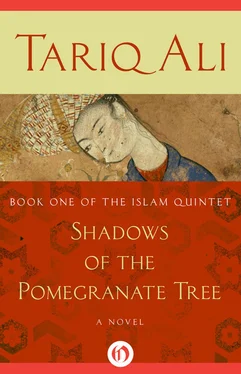Tariq Ali - Shadows of the Pomegranate Tree
Здесь есть возможность читать онлайн «Tariq Ali - Shadows of the Pomegranate Tree» весь текст электронной книги совершенно бесплатно (целиком полную версию без сокращений). В некоторых случаях можно слушать аудио, скачать через торрент в формате fb2 и присутствует краткое содержание. Жанр: Современная проза, на английском языке. Описание произведения, (предисловие) а так же отзывы посетителей доступны на портале библиотеки ЛибКат.
- Название:Shadows of the Pomegranate Tree
- Автор:
- Жанр:
- Год:неизвестен
- ISBN:нет данных
- Рейтинг книги:4 / 5. Голосов: 1
-
Избранное:Добавить в избранное
- Отзывы:
-
Ваша оценка:
- 80
- 1
- 2
- 3
- 4
- 5
Shadows of the Pomegranate Tree: краткое содержание, описание и аннотация
Предлагаем к чтению аннотацию, описание, краткое содержание или предисловие (зависит от того, что написал сам автор книги «Shadows of the Pomegranate Tree»). Если вы не нашли необходимую информацию о книге — напишите в комментариях, мы постараемся отыскать её.
The savagery of the Reconquest tore apart the world of the Banu Hudayl family. For the doomed Muslims of late-fifteenth-century Spain, the approaching forces of Christendom bring not peace but the sword. Capturing the brutality of a war both military and cultural — and the price paid by the innocent — Tariq Ali opens his Islam Quintet with a harrowing and profound historical fiction.
Shadows of the Pomegranate Tree — читать онлайн бесплатно полную книгу (весь текст) целиком
Ниже представлен текст книги, разбитый по страницам. Система сохранения места последней прочитанной страницы, позволяет с удобством читать онлайн бесплатно книгу «Shadows of the Pomegranate Tree», без необходимости каждый раз заново искать на чём Вы остановились. Поставьте закладку, и сможете в любой момент перейти на страницу, на которой закончили чтение.
Интервал:
Закладка:
‘Let us prepare as we have planned,’ said Zuhayr as the meeting ended and The Forty returned to the square.
The qadi mounted the platform and announced that the soldiers were on their way. The smiles disappeared. The vendors began to pack their wares, ready to depart. The crowd became anxious and nervous conversations erupted in every corner. The qadi asked people to remain calm. Women and children and the elderly were sent home.
Everyone else had been assigned special positions in case the Christian army tried to conquer the heart of the city. The men departed to their previously agreed posts. Precautions had already been taken and the defence plan was now put into operation. Within thirty minutes an effective barricade was in place. The kiln-workers, stonemasons and carpenters had organized this crowd into an orgy of collective labour. The barrier had been constructed with great skill, sealing off all the points of entry into the old quarter — what the qadi always referred to as ‘the city of believers.’
How amazing, thought Zuhayr, that they have done this all by themselves. The qadi did not need to invoke our past or call upon the Almighty for them to achieve what they have done. He looked around to see if he could sight al-Zindiq, but the old man had been sheltered for the night. And where, Zuhayr wondered, is Abu Zaid and his crazy family of reborn al-Ma’aris? Why are they not here? They should see the strength of our people. If a new army is to be built to defend our way of life, then these good people are its soldiers. Without them we will fail.
‘The soldiers!’ someone shouted, and the Bab al-Ramla fell silent. In the distance the sound of soldiers’ feet as they trampled on the paved streets grow louder and louder.
‘The Captain-General is at their head, dressed in all his finery!’ shouted another look-out.
Zuhayr gave a signal, which was repeated by five volunteers standing in different parts of the square. The team of three hundred young men, their satchels full of brickbats, stiffened and stretched their arms. The front line of stone-throwers was in place. The noise of the marching feet had become very loud.
The Count of Tendilla, Captain-General of the Christian armies in Gharnata, pulled his horse to a standstill as he found himself facing an impassable obstacle. The wooden doors lifted from their hinges, piles of half-bricks, steel bars and rubble of every sort had raised a fortification the like of which the Count had not encountered before in the course of numerous battles. He knew that it would need several hundred more soldiers to dismantle the edifice, and he also knew that the Moors would not stand idly watching as the structure came down. Of course he would win in the end, there could be no doubt on that score, but it would be messy and bloody. He raised his voice and shouted over the barricade: ‘In the name of our King and Queen I ask you to remove this obstacle and let my escort accompany me into the city.’
The stone-throwers moved into action. An eerie music began as a storm of brickbats showered on the uplifted shields of the Christian soldiers. The Count understood the message. The Moorish elders had decided to break off all relations with the palace.
‘I do not accept the breach between us,’ shouted the Captain-General. ‘I will return with reinforcements unless you receive me within the hour.’
He rode away angrily without waiting for his men. The sight of the soldiers running after their leader caused much merriment in the ranks of the Gharnatinos.
The Forty were less amused. They knew that sooner or later they would have to negotiate with Mendoza. Ibn Wahab wanted a fight at all costs and he won some support, but the majority decided to send a messenger to the al-Hamra, signifying their willingness to talk.
It was dark when the Count returned. The barricade had been removed by the defenders. Men with torches led the Captain-General to the silk market. He was received by The Forty in the room where they had held their meetings. He looked closely at their faces, trying to memorize their features. As he was introduced to them in turn, one of his escorts carefully inscribed each name in a register.
‘Are you the son of Umar bin Abdallah?’
Zuhayr nodded.
‘I know your father well. Does he know you are here?’
‘No,’ lied Zuhayr, not wanting any harm to come to his family.
Don Inigo moved on till he sighted Ibn Amin.
‘You?’ His voice rose. ‘A Jew, the son of my physician, involved with this rubbish? What is it to do with you?’
‘I live in the city, Excellency. The Archbishop treats us all the same. Jews, Muslims, Christian heretics. For him there is no difference.’
‘I did not know there were any heretics present in Gharnata.’
‘There were some, but they left when the Archbishop arrived. It seems they knew him by reputation.’
‘I am not here to negotiate with you,’ began the Captain-General after he had checked that the names of every member of The Forty had been taken. ‘All of you are aware that I could crush this city in the palm of my hand. You have killed a royal bailiff. The man who executed a servant of the King cannot remain unpunished. There is nothing unusual about this procedure. It is the law. Your own Sultans and Emirs dispensed justice as we do now. By tomorrow morning I want this man delivered to my soldiers. From henceforth you must accept the laws laid down by our King and Queen. All of them. Those of you who embrace my faith can keep your houses and your lands, wear your clothes, speak your language, but those who continue to make converts to the sect of Mahomet will be punished.
‘I can further promise you that we will not let the Inquisition near this town for another five years, but in return your taxes to the Crown are doubled as from tomorrow. In addition you must pay for the upkeep of my soldiers billeted here. There is one more thing. I have made a list of two hundred leading families in your city. They must give me one son each as a hostage. You seem shocked. This is something we have learnt from the practice of your rulers. I will expect to see all of you in the palace tomorrow with an answer to my proposals.’
Having uttered these words, more deadly than any soldier’s blade, Don Inigo, the Count of Tendilla, took his leave and departed. For a few minutes nobody could speak. The promised oppression had already begun to weigh heavy.
‘Perhaps,’ said Ibn Wahab, in a voice weak with self-pity and fear, ‘I should give myself up. Then peace will return to our people.’
‘What he said could not have been more clear. If we retain our faith the only peace they will permit us will be the peace of the cemetery,’ said Zuhayr. ‘It is too late now for grand gestures and needless sacrifices.’
‘The choice we are being offered is simple,’ chimed in Ibn Basit. ‘To convert or to die.’
Then the qadi, who of all those present, with the exception of Ibn Wahab, had felt the blow most deeply, began to speak in an emotionless voice.
‘First they make sure they are in the saddle and then they begin to whip the horse. Allah has punished us most severely. He has been watching our antics on this peninsula for a long time. He knows what we have done in his name. How Believer killed Believer. How we destroyed each other’s kingdoms. How our rulers lived lives which were so remote from those they ruled that their own people could not be mobilized to defend them. They had to appeal for soldiers from Ifriqya, with disastrous results. You saw how the people here responded to our call for help. Were you not proud of their discipline and loyalty? It could have been the same in Qurtuba and Ishbiliya, in al-Mariya and Balansiya, in Sarakusta and the al-Gharb, but it was not to be so. You are all young men. Your lives are still ahead of you. You must do what you think is necessary. As for me, I feel it in my bones that my departure will not be long delayed. It will free me from this world. I will die as I was born. A Believer. Tomorrow morning I will go and inform Mendoza of my decision. I will also tell him that I will no longer serve as an intermediary between our people and the al-Hamra. They must do their filthy work themselves. You must decide for yourselves. I will leave you now. What the ear does not hear the tongue cannot repeat. Peace be upon you my sons.’
Читать дальшеИнтервал:
Закладка:
Похожие книги на «Shadows of the Pomegranate Tree»
Представляем Вашему вниманию похожие книги на «Shadows of the Pomegranate Tree» списком для выбора. Мы отобрали схожую по названию и смыслу литературу в надежде предоставить читателям больше вариантов отыскать новые, интересные, ещё непрочитанные произведения.
Обсуждение, отзывы о книге «Shadows of the Pomegranate Tree» и просто собственные мнения читателей. Оставьте ваши комментарии, напишите, что Вы думаете о произведении, его смысле или главных героях. Укажите что конкретно понравилось, а что нет, и почему Вы так считаете.












